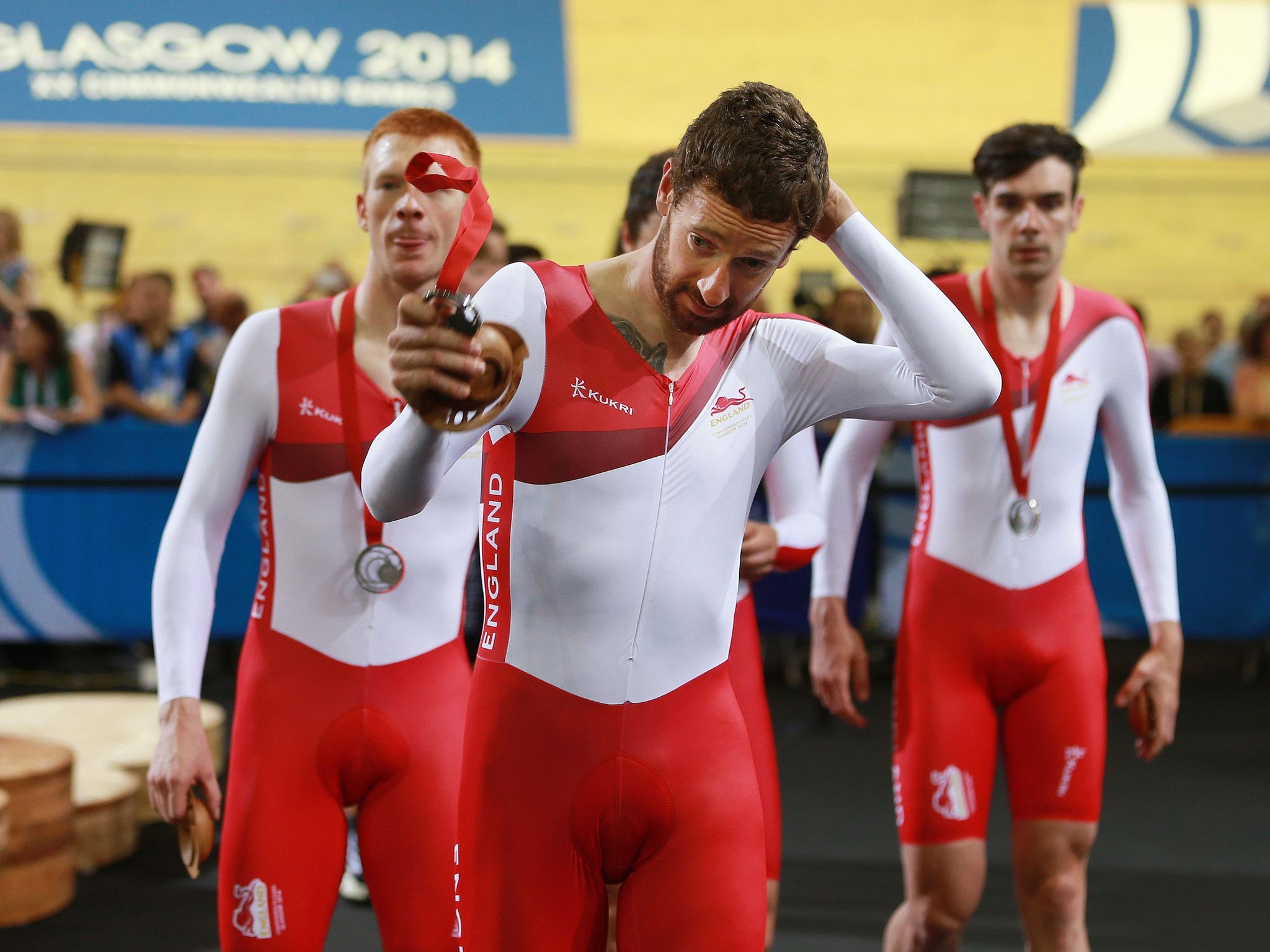Commonwealth Games 2014: Sir Bradley Wiggins and England win silver as Australia triumph in men's cycling team pursuit final
Disappointment for Wiggins in team pursuit final as England are forced to settle for silver by brilliant Australia

It was supposed to be the great track homecoming, the quest for a first Commonwealth Games gold medal. But the team pursuit title Sir Bradley Wiggins first attempted to win as an 18-year-old will now forever elude him.
There was no disgrace in picking up a fourth career Commonwealth silver medal. For much of this year the aspiration had only ever been to ride the Tour de France, it was only six weeks ago when Team Sky denied him that particular opportunity that he turned his attention to the banked velodrome.
There may be those that think Wiggins should have been riding towards the Champs-Élysées in Paris this weekend rather than pounding lap after lap of the Sir Chris Hoy Velodrome in Glasgow. But credit should go to Sky that he is here at all as a back-up plan, team principal Dave Brailsford the man that first instilled the idea in Wiggins of a Commonwealth Games ride.
On the track he was clearly England’s dominant rider, taking on the lion’s share of the work with occasional two-lap runs in front at a time in qualifying and the final, while team-mates Ed Clancy, Steven Burke and Andy Tennant, by no means slouches on two wheels, generally opted for one-lap stints.
In truth, whatever the tactic employed they were never going to match an Australia line-up stronger than the one that won the won the world title in Cali earlier in the year, Jack Bobridge taking the place of Mitchell Mulhern to ride alongside Luke Davison, Alex Edmondson and Glenn O’Shea. Even when Davison was dropped with a kilometre to go England could not claw back the difference and lost by four seconds.
While the Australians oozed fluidity, a unit with similar preparations, at times England looked more ragged than they have become accustomed to in the event.
As Wiggins came off the track, it was with an initial feeling of disappointment but, despite a gargantuan gap to make up to Australia, he was not disheartened enough to give up on one final shot at Olympic gold and bid to become Britain’s most successful Olympian with an eighth medal around his neck.
“In hindsight, we’ll look back and think this is a start point for us now for the next two years and Rio is the goal and we’ve got to work back from that,” he said. “I don’t want to sound like Roy Hodgson but we’ve definitely got some work to do. It’s going to take a lot of dedication to the track. It’s about winning in Rio for us.”
Come the Olympics in two years time, the British line-up ought to be bolstered by Olympic champion Pete Kennaugh, riding for the Isle of Man in Glasgow, and potentially Geraint Thomas depending on his road-racing ambitions.
The gold, on this occasion at least, may not have been the outcome but Wiggins said he had “answered the questions on whether I can still do it or not”.
It is to the track and day racing that Wiggins will now predominantly focus himself. Winning Paris-Roubaix remains a career ambition but hopes of emulating his 2012 Tour de France triumph or another big stage race for that matter have now gone. This year’s Vuelta, once mooted as a possible target when he was omitted from the Tour, has at the very least been scrapped.
“With the commitment it will take for the track and speeds we’ll have to go at, looking at changing body position, being heavier, more explosive, that will hinder the climbing in grand tours,” he added. “I don’t relish riding the mountains in the back group for three weeks having won the Tour. If you look at the progression of each Olympic Games it will become a sprint endurance race and I don’t think the road or, say, a grand tour will complement that.”
Wiggins was very much the main attraction on the first night in the velodrome but there were other medallists. England’s sprinters had struggled in the individual event in the morning but the trio of Philip Hindes, Jason Kenny and Kian Emadi combined to take silver half a second behind New Zealand in the team event.
Kenny admitted: “We’ve been struggling to put together really technically good rides, so it is something to build on as we look towards the World Championships and Olympics. There is no mad rush, we need to keep working hard and grinding away and hopefully the results will come in.”
For Australia’s Anna Meares it was another junction on her own comeback trail having taken time out after London 2012 during which she travelled and laid around home in her pyjamas.
As Meares pondered a return, she sought advice from Sir Chris Hoy, who texted her before her ride. She revealed afterwards: “He said ‘be sure to wipe your feet before you come into my nice new velodrome’.”
Instead Meares, watched from the commentary box by her former track nemesis Victoria Pendleton, wiped the floor in the 500m time trial, no one coming close to her, as she finished more than half a second clear of countrywoman Stephanie Morton in second, with England’s Jess Varnish taking bronze.
Scotland also won its first medal of the Games in the velodrome courtesy of 41-year-old Aileen McGlynn and guide rider Louise Haston but were pipped to gold by England’s 18-year-old Sophie Thornhill, who has just nine per cent vision because of a form of albinism, with Helen Scott.
Subscribe to Independent Premium to bookmark this article
Want to bookmark your favourite articles and stories to read or reference later? Start your Independent Premium subscription today.

Join our commenting forum
Join thought-provoking conversations, follow other Independent readers and see their replies